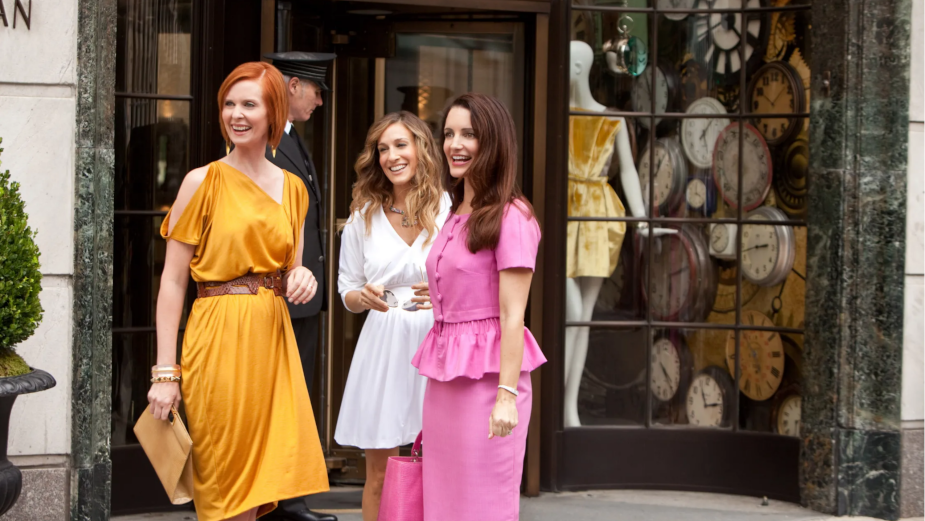
The Shoppable Media Dream of the ‘Sex and the City’ Revival

As many of us get excited about the return of Carrie Bradshaw and co, we will be loving the nostalgia but also hoping that And Just Like That brings Sex and the City well and truly into the 2020s.
We’ll expect more diversity, less conspicuous consumption, and less focus on finding a partner. But I don’t want to see wholesale change – I will still be looking out for the fashions, the lifestyle, and the witty scripts that made the original such appointment-to-view TV.
When the original Sex and the City first screened in June 1998, we didn’t watch TV with our phones in our hands, there was no such thing as shoppable media, and certainly no opportunity to ‘close the loop’ and buy instantly what you saw in the show.
Yet Sex and the City was a designer fashion marketer’s dream. It made Manolo Blahnik a household name, and turned the Fendi baguette and Dior saddle bags into coveted items. This time around, we are promised a lot more vintage designer looks, but if the sneak previews are to be believed, we won’t be short of new designer wear either.
And in 2021, it’s entirely possible for brands to capitalise on the amazing marketing opportunity that the show presents, to bridge that last metre between us and the TV, activating not only purchases, but also the discovery commerce that is driving so much social interaction, assisted in no small part by TikTok.
In a world where genuine attention is at such a premium, a hotly-anticipated show like And Just Like That creates collective cultural cat-nip. Brands are keen to find ways to borrow some of that magic, and the traditional routes of sponsorship, product placement, partnerships and promos already provide plenty of ways to interact with the audience.
It is exactly this cat-nip that has put Peloton directly in the public eye. Not just because of its product placement in the series, but the incredibly fast work that took place as being in one of the must-watch events of the year could have turned sour. For those who saw the series start, you’ll know that ‘Big’ has a heart attack after a workout…on a Peloton. It’s not a good look for the brand and while others may quake in their designer sustainable boots about the fallout, Peloton took hold of the situation and turned out a response on social media created and voiced by Ryan Reynolds and his production company no less.
If the series likes its drama, then this was a heck of a cliff hanger for adland. The luxury exercise bike brand managed to resurrect a high-profile character and switch the conversation. It was a bold move, deftly executed and one that took risk and swift decision-making to a new level. The response also reflects our new media landscape where it is not only possible to sink a brand with a TV show but it can resurrect both a character and brand fortunes through mass communication through entirely different platforms, ones that barely existed when the original series graced our viewing schedules. Was this dramatic piece of advertising better than the show itself?
New digital spaces can also be explored to elevate the viewing experience this time around. The HBO-sponsored Sex and the City apartment opens in Covent Garden, a place where you can sip cocktails, explore Carrie’s walk in wardrobe, and buy a Blu-ray box set of all six seasons and both movies.
But the technology exists to take this immersion into the digital space. In the Summer, ITV launched shoppable TV with Boots and Love Island, using AI features built into LG TV sets. Featured products were identified and tagged, and viewers could select them with their remote control, then make a purchase via the Boots site or a link sent to their phone.
It’s relatively simple, and although it might be a bit disruptive for a high engagement show like And Just Like That, it’s perfect for Boots and Love Island. But it was niche, because the worlds of technology and TV are still not as integrated as they could be.
The new media landscape has incredible potential to build more connected audience experiences, and fashion brands are at the forefront of this. We’ve recently seen some premium designers getting an extra shot at the spotlight: Balmain x Netflix The Harder They Fall collection, inspired by the designer’s love of western movies, is flogging £8000 jackets on the streaming giant’s e-commerce site, and there’s also a FarFetch collaboration promoting shoppable social content for the range.
Likewise, the high demand for the super-cool, distinctive tracksuits from Squid Game was a welcome late-year boost for South Korean garment manufacturers, although Netflix failed to cash in on this, and has instead created an official Young-Hee vinyl figure.
The influence of the screen on style is as old as the original Hollywood movies, but the dynamic has moved on – TV is no longer a passive medium, and TV viewing no longer has to be a passive experience.
For a media person like myself, the dream is that the loop is closed and the programme itself is fully shoppable, existing in a space where not only is everything media, but everything is also retail. A wave of a digital wand, and just like that, you can be Carrie or Miranda or Charlotte or Big. For a media planner, that’s got to be the look of the season.













